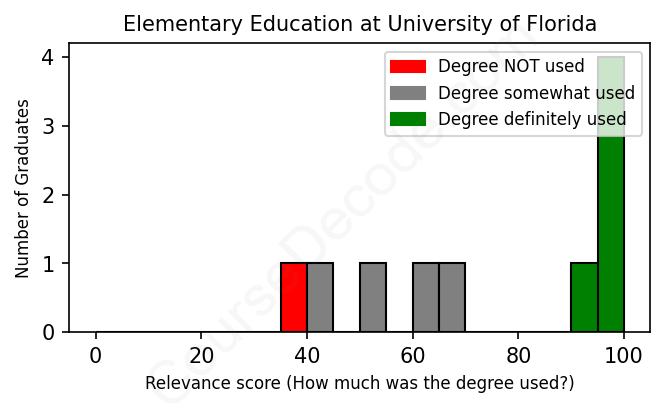
First, some facts. Of the Elementary Education graduates from University of Florida we've analyzed , here's how many have used (or NOT used) their degree in their career:

These are estimates based on AI analysis of 10 LinkedIn profiles (see below).
The verdict? Above average. Overall, with an average relevance score of 75%, Elementary Education graduates from University of Florida have a higher likelihood (+8%) of finding work in this field compared to the average graduate across all fields:
And for comparison, here's the chart for all profiles we've looked at across all degrees.
Also, after graduating, 40% of these graduates have pursued further education other than another Bachelor's degree (such as a Masters degree or other), compared to the average across all profiles of 35%. This suggests you may need more than just a Bachelors degree to be competitive as a Elementary Education graduate.
See the details:
|
Relevance score: 100% We think this person has gone into a career highly relevant to their degree. We think this person has gone into a career highly relevant to their degree.
DEGREE INFOGraduated in 2011 from University of Florida with a Bachelor of Arts (B.A.) in Elementary Education. Also pursued further education since (see below). JOB HISTORY SINCE GRADUATIONLead Teacher KinderCare Jan 2013 - Jul 2013 Teacher Leader  Atlanta Public Schools Jul 2013 - Present FURTHER DEGREES DONE SINCE GRADUATINGMaster of Education (M.Ed.)University of Florida 2011 - 2012 ABOUTTeacher LeaderGrade Level ChairTeacher of the Year 2017-18 |
The top 10 most common jobs done by the graduates we've analyzed (ranked most common to least) are:
From analyzing the LinkedIn profiles of graduates with a degree in Elementary Education from the University of Florida, it's clear that the most common job paths taken revolve around teaching and educational support roles. Many graduates have landed positions as teachers in various schools, such as Lead Teachers, Substitute Teachers, and specialized roles like English Teachers. These positions directly correlate with the skills and knowledge acquired during their studies, emphasizing pedagogy and student engagement, which are central to Elementary Education. Notably, roles like Teacher Leader and Instructional Coach also showcase their move into leadership and support functions within educational settings, further underlining the impact of their degree.
However, not all career choices seem closely aligned with Elementary Education. Some graduates have ventured into areas like program management and corporate roles, which, while potentially utilizing soft skills like communication and training, don't leverage the core knowledge of child development or teaching strategies. For instance, positions at FEMA or as Customer Success Managers appear more detached from the educational field. So, while many have maintained relevance to their degree through teaching-related roles, a significant number have also drifted into unrelated paths, raising questions about the direct application of their educational training in those settings.
Here is a visual representation of the most common words in job titles for Elementary Education graduates (this is across all Elementary Education graduates we've analyzed, not just those who went to University of Florida):

Graduates from the University of Florida with degrees in Elementary Education generally kick off their careers in teaching-related roles, like classroom positions, internships, or teaching programs such as Teach For America. For many, their first job straight out of college is often as a teacher in local public schools or private educational institutions. This seems to be the go-to path for most, and it's not uncommon for them to stay in teaching for a few years as they gain experience and build their resumes. However, as time goes on, the trajectory can vary quite a bit. While some remain committed to education, eventually moving into leadership roles like instructional coaches or curriculum developers, others make surprising leaps into entirely different fields that may not be directly related to teaching at all. This shift might include roles in corporate training, event planning, or operational management.
Fast forward five to ten years after graduation, and you'll see a blend of paths taken by these graduates. Those who stayed in education tend to take on more responsible roles, such as instructional coaches or managers at educational organizations, while others have ventured into corporate roles, indicating a desire for diversification away from traditional classroom settings. It’s interesting to note that while many graduates do remain closely tied to education, some have drifted away from it altogether, indicating a level of adaptability and willingness to explore new career options. The overall picture is a mixed bag: some have solidified their careers in education, while others have taken alternative routes that stray from the original path they might have envisioned when they graduated.
Getting a Bachelor’s degree in Elementary Education at the University of Florida, or anywhere really, can be a mixed bag in terms of difficulty. Generally, it’s not considered the hardest degree out there, but that doesn’t mean it’s a walk in the park either. You’ll dive into a lot of interesting stuff like child development, teaching methods, and classroom management, and you’ll definitely have some hands-on experiences like student teaching, which can be pretty intense. So, while it’s definitely manageable—especially if you’re passionate about teaching—it’s important to stay on top of your coursework and be prepared for a mix of theory and practice. If you’re really into working with kids and can handle the workload, you’ll likely find it more rewarding than challenging!
Most commonly, in the LinkedIn profiles we've looked at, it takes people 4 years to finish a Bachelor degree in Elementary Education.
Alright, so let’s break this down. It seems like a lot of these UF grads have followed the classic education route, which usually doesn’t pay super well right out of the gate. Many started as teachers or in similar roles, and while some eventually moved into positions that likely offer better salaries (like at FEMA or doing training management), it’s a bit of a slow climb. The higher-ups at places like City Year and Girl Scouts probably do okay financially, but overall, many of them seem to be settling into decent roles that won’t make them rich. The newer grads are starting in teaching jobs, which translates to more lower-end pay. So, in a nutshell, it looks like they’re making a living, but it might not be the kind of cash that’d have them rolling in luxury anytime soon!
Here is a visual representation of the most common words seen in the "about" section of LinkedIn profiles who have a Bachelor degree in Elementary Education (this is across all Elementary Education graduates we've analyzed, not just those who went to University of Florida). This may or may not be useful:

Here are all colleges offering a Bachelor degree in Elementary Education (ordered by the average relevance score of their Elementary Education graduates, best to worst) where we have analyzed at least 10 of their graduates: